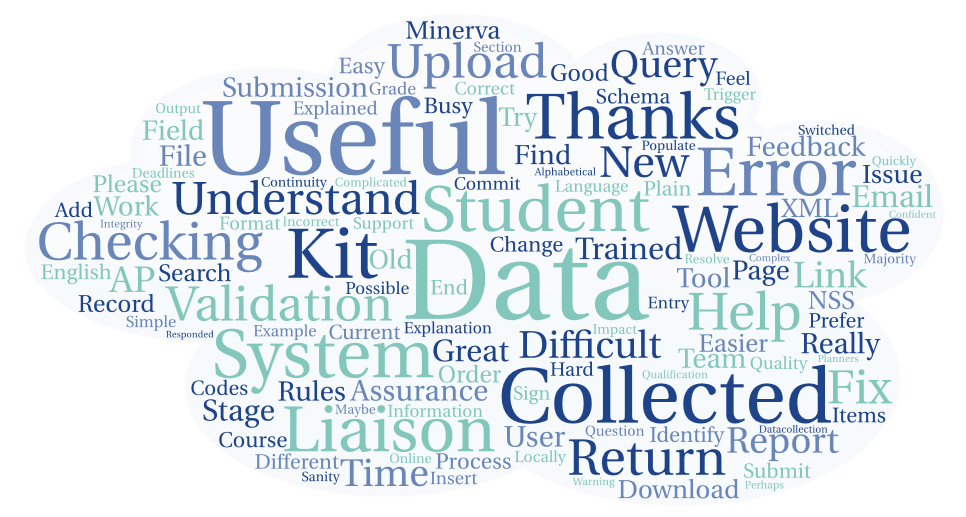Alternative Providers: Reviewing the collection
Just under 100 Alternative Providers submitted their AP Student return for the 2015/16 reporting year.
We recently asked those submitting Alternative Providers to complete a post-collection survey so that we could hear your feedback and better understand how the process was from your perspective. We’ve had 41 responses from a broad range of providers – with topics ranging from the philosophical ‘why do we need to do this?’ to the more practical ‘how do I use these reports?’.

This blog addresses some of the feedback we have received, and also includes some extracts from your comments. It is not exhaustive but summarises common themes raised. We are, of course, always happy to receive feedback at any point in the collection cycle.
Why are we making this submission?
"We'd benefit from an explanation as to what HESA stands for (for newcomers)"
A common theme that emerged from many respondents was ‘why are we doing this?’. We are conscious that Alternative Providers are new to the process of submitting data and to the HE policy and information landscapes. Because you have undergone the designation process – which allows your students access to public funding – you are required to report information to HEFCE and the Department for Education. HESA exists to support this data collection process. We operate within a statutory framework and are here to assist you and quality check your data submissions to allow you to fulfil your contractual obligations. We encourage those of you involved in the data return to speak with internal senior management to understand why the strategic decision of applying for designation has been made to better understand the associated benefits of access to public funding.
As well as supporting the data collection process, HESA also publishes a range of HE data. This includes our Experimental Statistical First Release of Alternative Provider data which will be released in February 2017. Keep an eye on our site to see how your data looks.
How do we better understand HESA terminology?
"You are dealing with non specialists - so please talk in regular English"
Another common thread that emerged concerned how we can help you to understand our processes and make our language more accessible. Your feedback showed we’re already making progress in this area. We’ve translated nearly half of our quality rules into plain English, and over 80% of you said you found these useful. We know there is more work to do here, and we are committed to expressing much more of our technical guidance in plain English.
"The new website is so much nicer than the old one!"
We’ve also delivered a new corporate brand and website which many of you loved. Nearly 95% of you found the data item descriptions on the website to be very or somewhat useful. We also received some constructive feedback and we’re working on further enhancements to the website to continue to improve functionality and usability. If you have any suggestions, do get in touch.
"Liaison are, as always, fantastic"
We were overwhelmed with the positive feedback you all gave about Liaison and our ability to articulate some of the trickier terminology into language that was more helpful. We endeavour always to be the friendly and reassuring voice at the end of the phone. We’d encourage providers to utilise this institutional liaison service: we’re available via email or telephone and have a wealth of knowledge across collections. Following a recent restructure we’re now also the individuals responsible for the guidance and governance of each collection so we’re always happy to receive comments or business change ideas.
We’d like some more training on certain areas, where can I find this?
"There used to be a Student for Planners course that HESA ran that was really useful for understanding these reports. Maybe you could run an AP for Planners?"
Lots of you said you found some of the reports we generate from your submission very useful – but knowing how to use them initially can be tricky. Many of you fed back that training on how to use these reports would assist you with your own internal quality assurance processes. We actually often cover this in our existing training sessions tailored to different audiences and stages of the submission cycle. The AP Pre-Collection and Introductory sessions that normally take place in the summer of each year are likely to address the reports we offer.
Alongside the group training sessions, we also offer bespoke visits which can be designed around your provider-specific requirements.
Overall
For many APs, this was your first or second year submitting data to us. We were, once again, impressed by the standard of engagement we received throughout the data collection process. We’d like to thank everyone who completed our survey, and look forward to continuing to improve our processes over the coming year.
Enhancing understanding: Hannah Cramer reflects on feedback from Alternative Providers

Hannah Cramer
